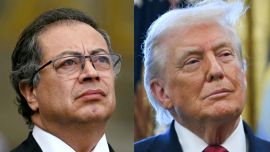Argentina’s presidential election on Sunday (October 22) broke new ground – for the first time since the creation of the PASOs more than a decade ago, the party that won the primaries did not retain its lead in the general election.
The Primary, Open, Simultaneous and Mandatory Elections, or ‘PASOs’ as they’re known in Argentina, were established in 2009 via Law 26.571 (Law of Democratisation of Political Representation, Transparency and Electoral Equity), and were used for the first time in the 2011 elections.
On that occasion, Sunday, August 14, the ticket featuring then-president and candidate for re-election for the Frente por la Victoria, Cristina Fernández de Kirchner, and her vice-presidential running-mate Amado Boudou, won 50.24 percent. Second place went to the Unión para el Desarrollo Social ticket, headed by Ricardo Alfonsín and Javier González Fraga, which took just 12.20 percent.
In the general elections, held October 23 of that year, Fernández de Kirchner increased her share of the vote further, taking 54.11 percent. Second place also changed hands and finally went to the Frente Amplio Progresista ticket of Hermes Binner and Norma Morandini, which scored 16.81 percent.
Four years later, in 2015, the ruling party's ticket of Daniel Scioli and Carlos Zannini won the PASO with 38.67 percent of the vote and the general election with 37.08 percent. The rival Cambiemos ticket won 30.12 percent with its three slates (Mauricio Macri-Gabriela Michetti; Ernesto Sanz-Lucas Llach; Elisa Carrió-Héctor Flores) in the primaries and 34.15 percent in October.
However, in the run-off the opposition emerged victorious, with Macri taking 51.34 percent against 48.66 percent for Scioli.
In 2019, the newly formed Frente de Todos ticket, which presented Alberto Fernández-Cristina Fernández de Kirchner as its slate, won the PASO with a resounding 47.79 percent against the 31.80 percent for the Juntos por el Cambio ticket headed by Mauricio Macri and dissident Peronist Miguel Ángel Pichetto.
After a strong campaign, the PRO leader managed to close the gap but was unable to turn the tide: Alberto Fernández was consecrated as president-elect with 48.24 percent, while Juntos por el Cambio took 40.28 percent.
This Sunday, thanks the Massa’s victory, Milei has an unwanted record: though he won the primaries, he was unable to add to his lead and finished in second position, finishing almost six points behind the ruling coalition hopeful.
– TIMES/NA























Comments